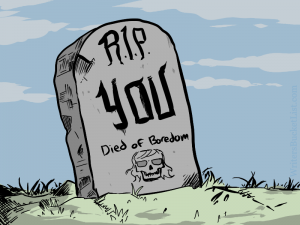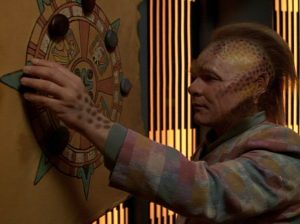Brandon Joyce wants to see a game that will last the Ages. Cathexis is defined as an intense fixation on an object, idea, or desire. In his writing, Joyce ties together this idea of cathexis in something he refers to as “lifegames,” the practices we engage in on a daily basis to distract ourselves from Boredom. He begs for the possibility of a game or practice that can survive the prospect of post-historical Boredom. A notion of immortality that emerges from this is the reconception of a desire for an end goal.


(Img 2: Startrek episode entitled Cathexis, with a board game-looking prop)
The cathexis present in games, from “Pac-Man fever” to the race to the shortest grocery store checkout line, is possessed by the thrill of the process of achieving a goal. Unlike the necessity of survival activities, the hook of playing games is the frenzy that incurs during the pursuit of meeting an end. Are we fixated on this means to an end–the process of fulfilling our desires–because of the inevitability of our own existential finitude? What will we, or can we, be fixated on in an immortal life?
As Joyce illustrates with the game of Miss Pac-Man, where the objective is to obtain points by eating ghosts (eating ghosts), people create desires out of nothing: ex nihilo, and that cathexis is the constant spinning of something from nothing. He stresses his belief that all desires are spun from nothing, that there is no need to connect them to a greater reality, and that it is fine for humankind to be “cosmically pointless” because we can take the practice and understanding of cathexis and “run with it.” We just have to invent new desires.
Cathexis is not a necessary survival instinct but a practice to cope with the precarity of mortality. Games, although they do not provoke survival consequences, fill people with passion. That is why lifegames, daily activities that people turn into games, are so important. Lifegames “bestow emotion on insensate things,” like catching falling leaves in autumn or building a snowman. People seem to feign for the ephemeral. What happens when our own ephemerality is lost?
Immortality itself is a form of cathexis. Once humans are able to conquer the finitude of life, and have met the end goal for the quest of immortality, the fixation on experience and lifegames would be completely restructured because survivability may not play a role in a value system. For example, competition is not a necessary aspect of games. One could say that competition is an instinct of survival. The erasure of competition may be possible when considering the actualization of immortality. The temporal aspect of games would also be completely reconceptualized or perhaps even removed. What is left may be strategy and creation.
Joyce denounces the human desire for a greater reality, but strives to see a complex “labyrinth of experience” that can withstand time. It can be argued that the game that has persisted throughout the Ages is the search for a higher order, and perhaps because there may not be an answer or an end to this pursuit, it can be the game continued by immortals to seek champion. If the search for a higher reality is a desire ex nihilo then it does not have an end, like the notion of immortality itself.
While there is obviously no answer as to what the cathexis and lifegames of a post-historical society may look like, it is interesting to conjecture the psychology and activities of immortals.

Sources:
Joyce, Brandon. “On Cathexis and Lifegames.” Kinetic Essays. Oct 2011. Web. 14 Mar 2017.
http://www.lifeactionrevival.org/kinetics/?p=178
http://littlezotz.com/wp-content/uploads/2016/03/boredom.png (image 1)
http://vignette1.wikia.nocookie.net/memoryalpha/images/1/19/Neelix_medicine_wheel_cathexis.jpg/revision/latest?cb=20100213132946&path-prefix=en (image 2)
http://www.dezignwithaz.com/images/8-ball-car-tattoo.png (image 3)
Recent Comments